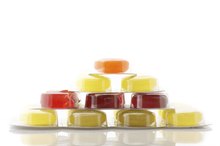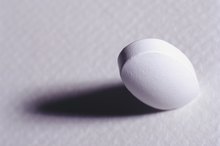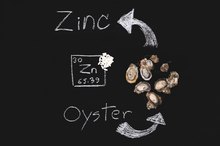What does fact checked mean?
At Healthfully, we strive to deliver objective content that is accurate and up-to-date. Our team periodically reviews articles in order to ensure content quality. The sources cited below consist of evidence from peer-reviewed journals, prominent medical organizations, academic associations, and government data.
The information contained on this site is for informational purposes only, and should not be used as a substitute for the advice of a professional health care provider. Please check with the appropriate physician regarding health questions and concerns. Although we strive to deliver accurate and up-to-date information, no guarantee to that effect is made.
Acid Reflux & Zinc
If you have acid reflux, you may want to evaluate your zinc intake. Getting at least 8 to 11 milligrams of zinc per day, depending on whether you're a woman or a man, will help keep your immune system working properly and allow your body to form DNA. This essential mineral, found in crabs, oysters, red meat, poultry, beans, fortified cereals, nuts and dairy products, may also help limit acid reflux symptoms more quickly than medications.
If you are experiencing serious medical symptoms, seek emergency treatment immediately.
Effect on Acid Reflux
A study published in "The American Journal of Gastroenterology" in 2011 found that taking zinc quickly relieved acid reflux symptoms in both rats and people. The effects lasted for more than three hours. However, this was a small study, so further research is necessary to determine whether zinc is a good alternative to other acid reflux treatments and which dose of zinc works best.
- A study published in "The American Journal of Gastroenterology" in 2011 found that taking zinc quickly relieved acid reflux symptoms in both rats and people.
- However, this was a small study, so further research is necessary to determine whether zinc is a good alternative to other acid reflux treatments and which dose of zinc works best.
Potential Mechanism
Side Effects of Zinc Lozenges
Learn More
Acid reflux, which affects up to 35 percent of Americans, is sometimes due to the stomach producing too much acid. Zinc may help limit the amount of acid produced by the stomach, making it less likely for excess stomach acid to be pushed back up the esophagus as acid reflux.
Compared to Other Treatments
Some of the other treatments for acid reflux, called proton pump inhibitors, can take two to three days to relieve symptoms. In contrast, zinc offers faster relief. However, the relief isn't as long-lasting. As long as you don't overdose on zinc, it tends to be less likely to cause side effects like dizziness, headaches and diarrhea.
- Some of the other treatments for acid reflux, called proton pump inhibitors, can take two to three days to relieve symptoms.
- As long as you don't overdose on zinc, it tends to be less likely to cause side effects like dizziness, headaches and diarrhea.
Potential Risks
Zinc Citrate Side Effects
Learn More
Check with your doctor before taking zinc supplements, which are usually in the form of zinc salts, such as zinc sulphate, zinc acetate or zinc gluconate 2. Zinc supplements can also interact with certain medications, including penicillamine, diuretics and some types of antibiotics 2.
Related Articles
References
- Yale News: Yale Study Shows Zinc Salts Offer Rapid Relief From Gastric Reflux
- Office of Dietary Supplements: Zinc
- NEJM Journal Watch: Zinc Inhibits Gastric Acid Secretion
- Mayo Clinic Laboratories, Test ID ZNS, Zinc, Serum
- Nakamura H, Sekiguchi A, Ogawa Y, Kawamura T, Akai R, Iwawaki T et al. Zinc deficiency exacerbates pressure ulcers by increasing oxidative stress and ATP in the skin.J Dermatol Sci. 2019 Jul 12. pii: S0923-1811(19)30197-5. doi: 10.1016/j.jdermsci.2019.07.004. [Epub ahead of print]
- National Institutes of Health, Office of Dietary Supplements, Zinc, Fact Sheet for Health Professionals
Writer Bio
Based in Massachusetts, Jessica Bruso has been writing since 2008. She holds a master of science degree in food policy and applied nutrition and a bachelor of arts degree in international relations, both from Tufts University.









